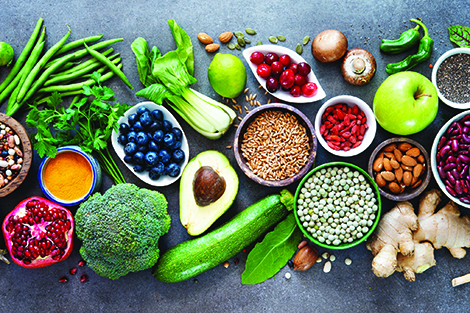As a health coach, nutritionist and personal trainer, I’ve experienced firsthand the shift toward more people turning to plant-based nutrition rather than animal-based foods. And when they do, the first question that converts face from friends, relatives and naysayers is what I call The Protein Question.
The question is so ubiquitous for those that adhere to a plant-based diet that one would think the hospitals are filled with ashen-skinned, protein-deprived vegans. Ironically, it is quite the opposite. Following a whole-food plant-based diet has many health benefits, including lowering your risk of obesity, diabetes and inflammation.
Back to the question: I’m sure you have already guessed that it is…“But where do you get your protein from?â€
We are definitely a country obsessed with protein, and lately we seem to be on protein overload. So here’s a piece of information which might surprise you—and silence those protein fanatics once and for all: The recommended daily allowance (RDA) for protein, as of now, is .8 grams per kilogram (kg) of body weight. Elite athletes, body builders may require a bit more. However, this is pretty standard for most people. And it’s fairly easy to get that amount of protein from a plant-based diet.
Protein is a concentrated source of amino acids which are the building blocks of muscle and other functions, and all plant foods contain various amounts of amino acids. Animal protein is just a more concentrated source, but (and here’s the key) more isn’t necessarily better. Because most animals are not carnivores, and certainly all animals that we as humans consume fall into that category, they get their nutrition from plant foods, so animals end up just being the middle man.
What all of the above means is that eating a wide variety of whole plant foods (vegetables, beans, whole grains, nuts, seeds, legumes, fruits) along with a proper amount of calories according to individual needs will ensure that you get all the protein and amino acids you need to sustain healthy muscle mass. It’s as simple as that, and in addition, plant-based foods also contain fiber, antioxidants, phytonutrients and polyphenols–things that animal protein products don’t.
The good news is that absolutely anyone can go plant-based, as there are no nutrients found in animals that aren’t already found in plants. The only exception is B12, which is actually a bacteria found in diminishing amounts due to the recent concerning trend toward worldwide soil depletion. As such, animal feed has had to be supplemented with B12. The ironic part of this is that B12 deficiency can actually be found in anyone, not just vegans. This is easily addressed by taking a daily or weekly supplement.
I’m not entirely sure where this fascination with ensuring that vegans get their protein came from. It’s lovely to imagine that meat-eaters have such a worry about our daily nutrient intake because of some concern for our health. But I tend to think it’s because they want to rationalize their own carnivorous diets by dismissing plant-based as lacking in protein and nutrients.
So when the next person asks where you get your protein—and you know they will—tell them to speak up because your hearing is gone from lack of protein. I kid. Tell them you get your protein from everything you eat on your plant-based diet, with a little help from a nutritional supplement or two.
Roxanne Lavin, who wrote this article,

is a health coach and plant-based nutritionist based in Las Vegas, Nev.